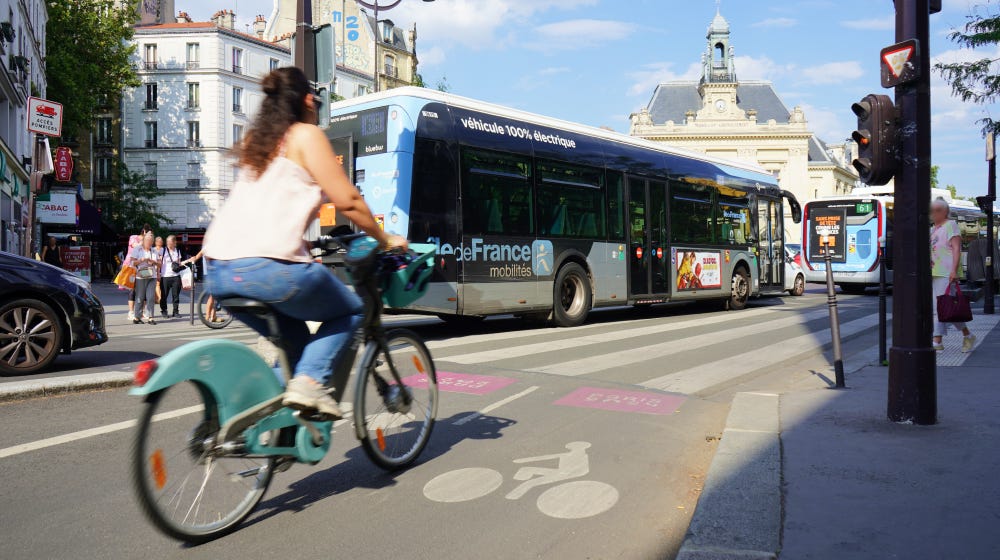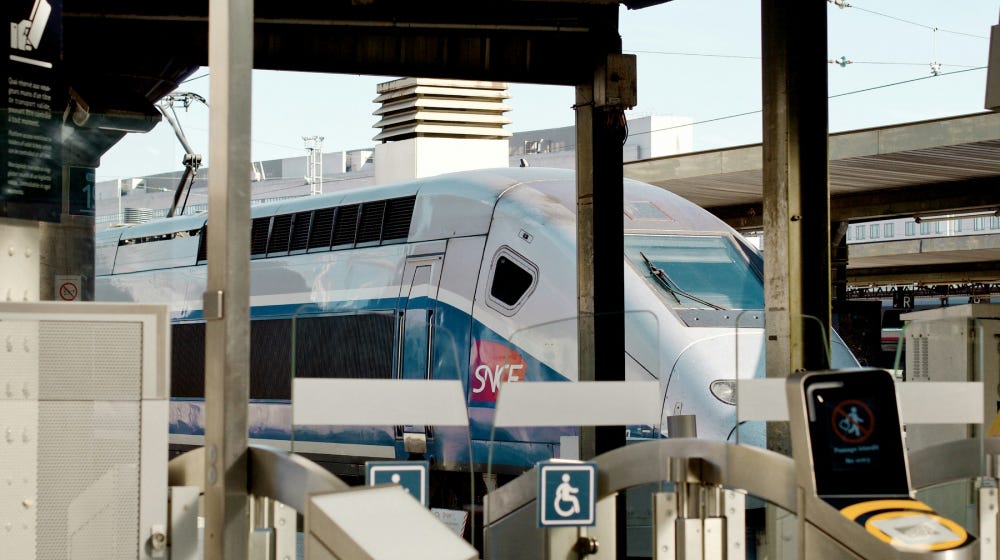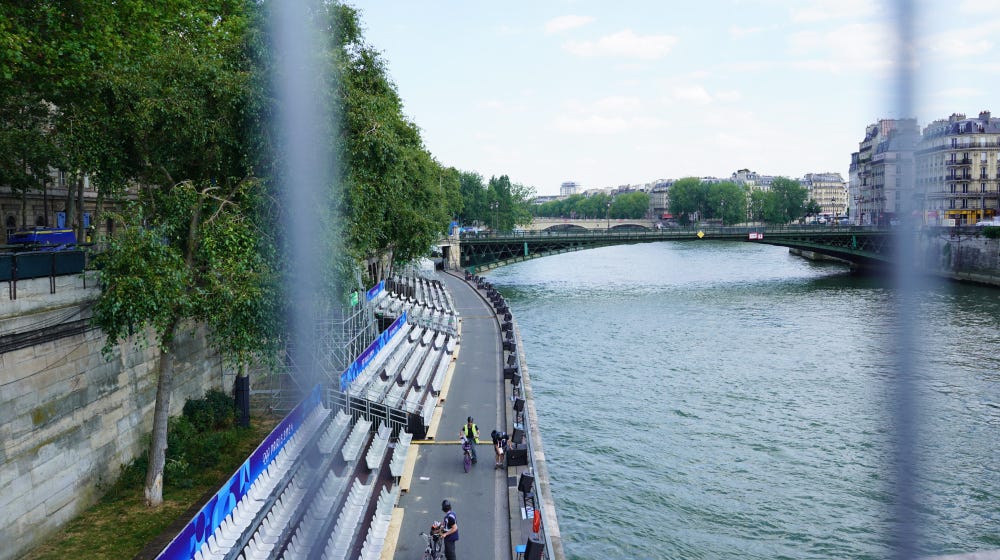Welcome to CoMotion NEWS, your weekly roundup of news and analysis of the mobility revolution. If this email was forwarded, you can sign up here for NEWS.
Last week our Paris-based Managing Director Tim Gribaudi walked us through the gargantuan efforts Paris is making to safely accommodate 15 million visitors in the relatively small city center. The challenge was underscored on Day 1 when mysterious arson attacks on the national rail system delayed travel for hundreds of thousands. Fortunately, things have since gone pretty smoothly…knock on wood.
This week we’re taking a step back and focusing on the incredible long-term changes Paris has made to become greener, safer and easier to get around. Most of them have nothing to do with the Olympics, but in some cases the prospect of a massive international spotlight certainly helped to move things along. We're crossing our fingers it will be a similar story in Los Angeles four years from now!
Undoing CARtastrophe
Like many cities built long before the advent of the automobile, Paris engaged in a decades-long love affair with auto-centric planning following World War II. “We must adapt Paris both to the lives of Parisians and to the needs of the automobile,” said President Georges Pompidou, for whom an expressway along the Seine was later named, in 1971. The big expansion of highways through and around the city thankfully did not condemn Parisians to America-style car dependence, but it still came at a big cost to walkability, air quality and safety. By 1990, more than half of Paris households owned a car, well above the share in Manhattan.
However, by the 1990’s, Parisians began to rebel against car supremacy. The first new Metro line in 60 years opened in 1998, the city began to periodically close major streets to cars on Sundays and holidays and in 2007 Paris launched one of the first bike-share programs. Between 2001-2018, car trips in the city declined 60%.
But none of those changes compared to the radical shift championed by Mayor Anne Hidalgo. In 2017 she and her allies on the City Council turned two miles of fast-moving expressway alongside the right bank of the Seine into a giant urban trail. When the pandemic hit in 2020, the city kicked passenger vehicles off Rue de Rivoli, transforming the major east-west thoroughfare from four lanes of vehicle traffic and two parking lanes into one lane for buses and taxis alongside large protected bike lanes. Most radically, this year the city implemented a ban on through traffic in a big chunk of the city center. People are still allowed to drive into the area, but only if they are planning on making a stop in the city (for work, shopping, recreation etc). They are not allowed to drive through the city without stopping.
Vive la VELOlution
Despite being a bike-share pioneer, until recently the City of Light was not particularly bike-friendly. Its stellar public transit system and world renowned pedestrian experience allowed most Parisians to live car-free, but its streets were generally hostile to those on two wheels. The cycling experience paled in comparison to many other French cities like Strasbourg and Bordeaux, not to mention European bike paradises such as Amsterdam and Copenhagen.
That all changed when the pandemic prompted the city government, led by Mayor Hidalgo, to aggressively reallocate space from cars to pedestrians and bikes in the hopes that it would deter them from crowding on to metros. But what began as a short-term tactic to control the spread of the virus soon blossomed into a long-term strategy to transform the walking and biking experience in one of the world’s greatest cities.
The result: Paris now boasts 695 miles of cycle paths, up from only 125 in 2001.

Cycling advocates are blown away by how quickly Paris has been able to change. The city rapidly deployed bike infrastructure of every kind to make cycling easy, safe and comfortable. Describing a trip to Paris last year, Bay Area transit reporter Roger Rudick said he couldn’t walk “more than one minute” in any direction without coming across new construction aimed at improving the walking and biking experience.
“I’ve never seen such in-your-face, undeniable proof of a city committed to change - and to safety. They aren’t hand-wringing over the design of a single street here or there—no, Paris is in the process of transforming the entire city, everywhere, all at once.”
The Grand Paris Express
Paris’s 120-year-old Metro is one of the world’s best rail systems, and the city is in the process of dramatically expanding it. The Grand Paris Express adds four new enormous lines, totaling 120 miles, that stretch deep into the city’s rapidly-growing suburbs. The massive transit expansion not only complements the city’s strategy of discouraging suburban car commutes, but it makes the cultural and economic wealth of the city center far more accessible to those living in some of the region’s economically depressed outskirts.
The project is obviously not cheap –– the projected cost has risen from €19 billion in 2010 to €38 billion –– but the French are likely getting it done for a fraction of what it would cost in the U.S.
The scooter standoff
There is one notable exception to Paris’s embrace of car-free mobility: its rejection of scooter-sharing. In response to complaints about an explosion of micromobility devices clogging picturesque sidewalks, the future of scooter-sharing was decided by a popular referendum.
And the voters –– at least the relatively small number who showed up –– showed no mercy. Eighty-nine percent voted to ban rental scooters from city streets. Parisians are still allowed to own and ride their own e-scooters, but the likes of Lime and Bird are no longer welcome in the French capital. Electric bike-sharing, however, remains legal and ubiquitous!
Safe for swimming?
The Olympics has prompted Paris to do something that it has neglected for generations: cleaning up the Seine. The notoriously yucky river has been off-limits to swimmers for a century, but since 2015 city has spent an estimated $1.5 billion to make it clean enough to use for a number of open-water swimming events at the Summer Games.
Did it work? Well…Hidalgo was forced to postpone plans to take a dip in the river on June 23 when tests revealed unsafe levels of bacteria. She later made good on the promise and declared the water, “very, very good.” Since then, however, the organizers have postponed the men’s triathlon after heavy rains increased the bacteria to unsafe levels. Let’s hope the recent good weather will stay and the activities will go ahead!
Desert Horizons: What Can NEOM Teach Us About the Future of Mobility?
On this episode we are joined by Adam Giambrone, MBA, a senior transportation executive with decades of experience in providing innovative transit solutions who's threading the needle between legacy transit and the most forward-looking systems on the globe. Most recently, he was the Director of Urban & Regional Mobility and Head of the Road Department at Saudi Arabia's massive NEOM project. Previously, he was the 'streetcar czar' of New York City, heading up an ambitious plan to connect Astoria all the way to Red Hook via streetcar.
Hear from Adam on what we can learn from building a system from the ground up, what's in store for NYCMTA following the collapse of congestion pricing, and how digitization is disrupting the century-old farebox. Tune in now!
Don’t miss the upcoming 8th edition of CoMotion LA kicking off on Nov. 13-14, after the OMF Summit on Nov. 12 - taking place at the Japanese-American National Museum.
Forge meaningful connections, introduce big ideas and new technologies, and interact with a global community of public and private sector leaders, innovative companies, speakers, and mobility stars. Attend two days of stellar programming, engaging panels, workshops, demos, networking, energizing talks — and after-hours gatherings.
Get your pass to the most important mobility gathering of the year - register now and save 50% off!
CoMotion's mobility goodness brought to you by:
Jack Craver,
Editor, CoMotion NEWS
jcraver@comotionglobal.com
Write to us if you would like to suggest content for our next newsletter!
Partner with us
Our events CoMotion LA, CoMotion MIAMI, and the Monaco Hydrogen Forum represent a unique opportunity to build global awareness in the industry. Build influence, elevate your brand, and connect with ground-breaking companies and public sector leaders.
“It's really exciting to be at this year's CoMotion, with the best, most creative, and innovative minds together thinking about solutions on how we advance transportation.” - Laura Rubio Cornejo, General Manager, LADOT
Email us if you are interested in learning more.
YouTube | LinkedIn | Podcast | X








